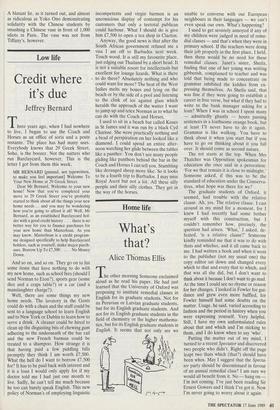Home life
What's that?
Alice Thomas Ellis
The other morning Someone exclaimed aloud as he read his paper. He had just learned that the University of Oxford was proposing to institute remedial classes in English for its graduate students. Not for its Peruvian or Latvian graduate students, but for its English graduate students. And not for its English graduate students in the field of chemistry or the higher mathema- tics, but for its English graduate students in English. It seems that not only are we unable to converse with our European neighbours in their languages — we can't even speak our own. What's happening?
I used to get severely annoyed if any of my children were judged in need of reme- dial classes — and that's when they were in primary school. If the teachers were doing their job properly in the first place, I held, then there would be no need for these remedial classes. Janet's sister, Sheila, finding that one of her young was writing gibberish, complained to teacher and was told that being made to concentrate on grammar inhibited the kiddies from ex- pressing themselves. As Sheila said, that was fine if they were going to establish a career in free verse, but what if they had to write to the bank manager asking for a loan? When I was in school I spent many — admittedly ghastly — hours parsing sentences in a loathsome orange book, but at least I'll never have to do it again. Grammar is like walking. You have to think about it when you start but if you have to go on thinking about it you fall over. It should come as second nature.
The rot starts at the top. When Mrs Thatcher was Opposition spokesman for education she once said in a peroration: 'For we that remain it is close to midnight.' Someone asked, if this was to be the standard of education under the Conserva- tives, what hope was there for we?
The graduate students of Oxford, it seemed, had trouble with the relative clause. Ah, yes. The relative clause. I cast around in my mind for a moment, for I knew I had recently had some bother myself with this construction, but I couldn't remember how, precisely, the question had arisen. 'What,' I asked, de- feated, 'is a relative clause?' Someone kindly reminded me that it was to do with thats and whiches, and it all came back to me. I had written a book and when it went to the publisher (not my usual one) the copy editor sat down and changed every which to that and every that to which, and that was all she did, but I don't want to think about it because I don't want to go mad. At the time I could see no rhyme or reason for her changes. I looked in Fowler for gui- dance and grew even more baffled, for Fowler himself had some doubts on the matter. Usage, he said, varied according to fashion and the period in history when you were expressing yourself. Very helpful. Still, I have my own unformulated rules about that and which and I'm sticking to them, and I do know when to say 'who'.
Putting the matter out of my mind, I turned to a recent Spectator and discovered two people who didn't. Right off the page leapt two thats which (that?) should have been whos. May I suggest that the Specta- tor party should be discontinued in favour of an annual remedial class? I am sure we would all benefit from it. No — hang on I'm not coming. I've just been reading Sir Ernest Gowers and I think I've got it. Now I'm never going to worry about it again.


















































 Previous page
Previous page